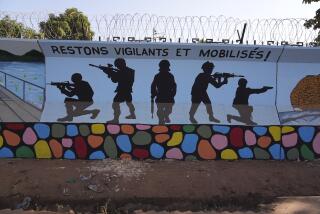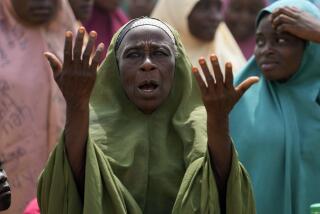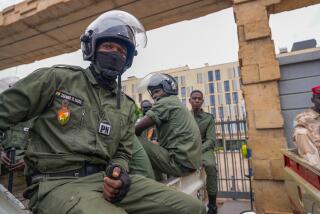Nigeria on the Brink: ‘Across the Country There Is an Evil Disquiet’
- Share via
LAGOS, Nigeria — For Nigeria’s 100-million-plus people, just when life over the past five years appeared to be getting better, it’s suddenly bad again. When there was a glimmer of hope about the future, an unforeseen tragedy sends the nation backward.
Nigeria’s main problem is bad governance, imposed on a hapless people by a thieving military oligarchy that has ruled the country for 28 years out of its 38 years of independence. The military continues to cling to power, refusing to accept alternatives or listen to better ideas.
In a reign of bad thought leading to bad consequences, the most recent was the death on Tuesday of Chief Moshood Abiola, the undeclared winner of 1993 presidential elections. The military, after Abiola led comfortably in the balloting, annulled the election by fiat. This was an election considered the freest and fairest ever conducted in the country.
Abiola was detained, his supporters hounded into exile, imprisoned or assassinated. The Nigerian government was treated as a pariah by the international community.
The 1993 election could have offered Nigerians an opportunity to redirect their potential and create a society based on constitutional rule and open competition. At the time, there were great expectations about the future; people spoke enthusiastically about the promise of an open society. The military scuttled this opportunity.
Following the death last month of Gen. Sani Abacha, a despot who ruled Nigeria from 1994 to 1998, there had been renewed optimism that a new military administration, headed by Gen. Abdulsalam Abubakar, would make a clean break with the past, reorganize the electoral process and resolve what had become the Abiola question.
Abiola had been in solitary confinement since June 1994. In the past two weeks, however, the military had begun to reach out to the international community and there was talk about change. U.N. Secretary-General Kofi Annan and his Commonwealth counterpart, Nigerian-born Emeka Anyaoku, visited Nigeria and met with the country’s most famous detainee. According to Annan, Abiola was in high spirits, even if he had reportedly asked the U.N. secretary-general, “Where is that Egyptian?” (a reference to former U.N. Secretary-General Boutros Boutros-Ghali). As things turned out, Abiola had only a few more days to live.
His death--whether from a heart attack or other causes--is a major setback for the cause of peace and reconciliation in Nigeria. Abiola was Nigeria’s only remaining hope of returning the country to the path of understanding. He was the only man who could have provided a rallying point for the nation’s aggrieved constituencies. Rumors of his imminent release had calmed frayed nerves, and Nigerians for the first time in five years were beginning to use such words as “future,” “consensus” and “progress.”
Nigeria’s military will have to accept the blame for Abiola’s death. Imprisonment of any form in Nigeria is the shortest distance to the graveyard. The country’s penal system is designed to harm and destroy, not to reform. Former detainees and prisoners, including Gen. Olusegun Obasanjo, granted amnesty a month ago, have sorry tales to tell about Nigeria’s military gulag. Abiola was denied medical care and refused access to his personal physician and family members. He was granted the privilege of seeing television only a week ago.
The sign of things to come is already evident. Since Tuesday, Nigeria has been practically at a standstill. Many people had to stay indoors as protesters took over the streets, lighting bonfires, killing and brutalizing anyone perceived as pro-military. Banks have been shut down, shops in Lagos deserted. Across the country, there is an evil disquiet.
With Abiola’s death, the country has been thrown back to 1966, when a similar outbreak of public indignation took on an ethnic coloration that resulted in a costly three-year civil war. Now the ethnic banner is again being waved. In Lagos, Abiola’s kinsmen, the Yorubas, are engaged in retaliatory killings of Hausa/Fulani people, the same ethnic background as the top echelon of Nigeria’s military rulers. If the killings continue, the situation in Nigeria could become truly tragic.
The ominous news now is that the military leadership has no original ideas about how to contain the situation. Abubakar, the head of state, has appealed for calm, noting that Abiola’s death marks a sad moment in the life of the nation.
Ethnic coloration is bound to prove critical in any future negotiations between the military and the pro-democracy coalition. Abiola, as a Yoruba Southerner in the presidency, would have helped to break the North’s monopoly and stranglehold on power. Nigerians in the South are bound to believe that both the annulment of the 1993 election and Abiola’s death on the eve of his release are parts of a conspiracy to deny Southern access to power. In a country that is sharply divided along ethnic and religious lines, such conspiracy theories have the potency of a nuclear bomb.
Nigerians, along with the international community, heaved a sigh of relief when Abacha died suddenly on June 8. Abiola’s death has reversed this optimism. The international community must intervene quickly, establishing links with Nigeria’s civil society and its religious, ethnic and cultural groups, to prevent what could be imminent chaos.
The Nigerian public is awaiting the results of an autopsy of Abiola’s remains, being conducted by doctors from Britain, Canada and the United States. The combatants are preparing for another round of battle. The victims in all this are the ordinary Nigerians, who in the past five years have watched helplessly as the country’s economy, standard of living and public infrastructures collapsed under the weight of political instability and governmental malfeasance.
Nigeria’s military must yield power so the people of the nation can determine their future.
More to Read
Sign up for Essential California
The most important California stories and recommendations in your inbox every morning.
You may occasionally receive promotional content from the Los Angeles Times.









